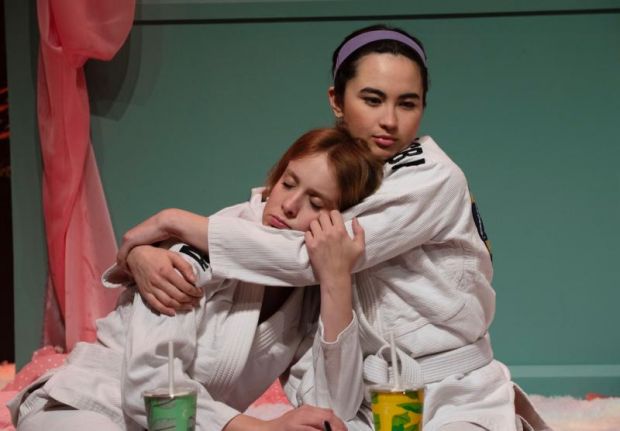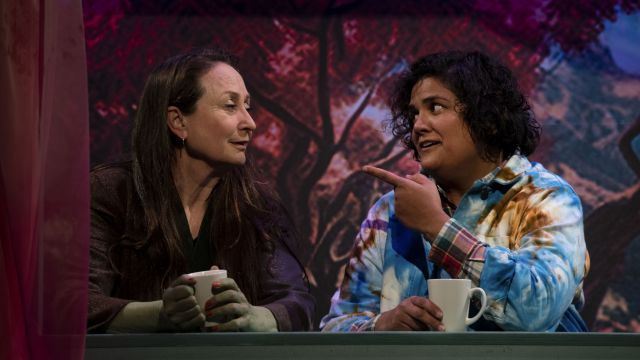SHHH
In a series of thematically linked vignettes, SHH gives us women’s experience of their bodies – of their bodies’ violation, manipulation, fluids and excretions. One irony is that the women here refer to their bodies almost as if they do not inhabit them – as if they are unconnected to them. The title – Shhh – might mean, ‘don’t talk about these things’ – or it might mean, ‘No, we must talk about these things in order to change them.’
The central character is Shareen (Jessica Clarke) a television writer. The play begins with her ‘friend with benefits’ Kyle (Peter Paltos), man-boy, sitting on her toilet, telling a story of a horrific dismemberment. They’re both laughing. Then Kyle fingers her – but with his big toe, still on the toilet. Shareen doesn’t object or show any sign of pleasure. It’s a new experience, anyway.
Shareen’s sister, Sally (Caroline Lee) - aka ‘Witchy Witch’ – represents another take on these issues. She takes non-binary Preeya (Sunanda Sachatrakul) on their first date to a Morbid Anatomy Museum (apparently there really was one in Brooklyn). Preeya claims en passant to only feeling really relaxed at sex parties. Sally is undeterred.

She is a postal worker (and witch) who claims she connects with people via their mail, especially when she enters a foyer. But she also connects with people via her ASMR (Autonomous Sensory Media response) tapes. The show begins with one of these: we listen to its soothing nonsense in total darkness. These tapes are meant to engender relaxation via a form of mindfulness that is entirely solipsistic. There is also Sally’s device that gives the client little electric shocks all over their bodies…
Later, Shareen, who has some undefined medical condition, tells Sally of an attack of diarrhoea while having sex with Kyle which left them both, and the bed, coated in shit.
That could happen, of course, except that in Shareen’s anecdote – told in an amused how-about-that style – Kyle doesn’t stop pounding. Naturally, we imagine this. Do we laugh, shudder or grimace? Do we believe it? And why is this anecdote in the play? Because it is deliberately ‘shocking’ and disgusting and puts the emphasis clearly on one of Shareen’s bodily fluids – and therefore on her body – this maligned, out of control thing that carries her brain around.

In one scene – perhaps the clearest and certainly the funniest – Shareen is in a café, eavesdropping on two girls Sandra (Jess Lu) and Francis (Hayley Edwards) in karate or jujitsu outfits, exchanging experiences of consent that weren’t really consent – i.e. rape – and how men will do anything to get what they want. One of the girls comments that if there were a button she could press that would kill every heterosexual man on earth… The comedy is in Shareen’s reactions that flit over her face as she listens (lovely performance here from Jessica Clarke): uh-huh, sad, wistful, ironic, knowing… She’s probably thinking of Kyle – and others, many others.
Women in the audience must recognise these experiences even if they have not had precisely these experiences – and men must shiver or cringe at or simply deny their part in them.
The other strand – if that’s the word – is the Witchy Witch witchcraft, which Sally and Shareen take perfectly seriously. In one scene, Sally combines bodily fluids, including Shareen’s readily available menstrual blood, in a traditional black cauldron. The sisters then drink the mix – which appears to empower them, leading to what looks like an extended orgasm. Illusionary perhaps but the only sign of pleasure – except for the reversal of when Shareen spanks Kyle’s naked arse.

All this takes place on Romanie Harper’s ironic set – cushions, blankets, thick pile carpets, pinks and orange colours and coral lights against an idyllic background of a peaceful garden or grove of flowering bushes and a soft, glorious sky. The perfect setting for exploitative sex – for which there is a discreet but coy central screen – and the flow of body fluids.
Although disembodied bodies recur in almost every scene, the overriding theme, or so it seems to me, is the loneliness of the play’s characters, that is, their inability to connect with their own bodies or with another person. Towards the end, as a sort of climactic realisation, Shareen tells the audience, ‘I am a machine for other people’s desires, and I don’t quite know how that happened or how to make it stop.’
But there is no plot here, no shape, no momentum, no narrative drive beyond despair – a mode with which director Emma Valente perhaps feels comfortable – as does dramaturg Noemie Huttner-Koros. I guess you don’t mess with the text of a multi-award-winning playwright. But the scenes seem like random illustrative examples, the purpose of which is to raise and draw attention to the condition of women and their bodies – which is fine but limited. There is no on-stage antagonist (Kyle is merely representative) except ‘the world’ and ‘men’ as they ever were. Thus the play can be taken as a hundred-minute howl of outrage or an account of ‘the female body’ that might act as a catalyst. We might say, riskily, that something like Fleabag does this rather better with humour and a plot, is less ‘shocking, but says more than ‘isn’t life shit’, and without such a relentless intention to rub our noses in it.
Michael Brindley
Photographer: Jodie Hutchinson
Subscribe to our E-Newsletter, buy our latest print edition or find a Performing Arts book at Book Nook.

